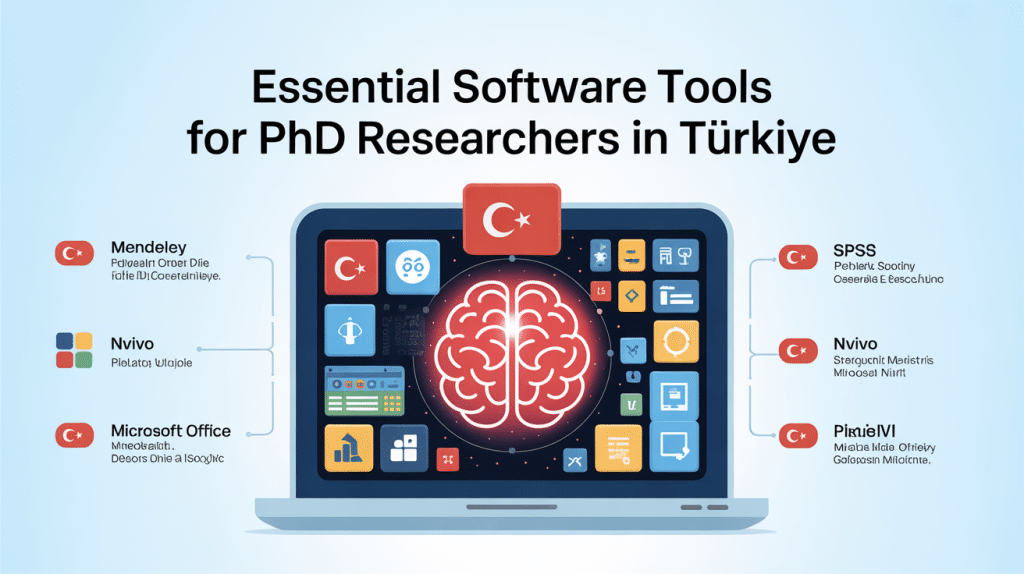Essential Software Tools for PhD Researchers in Türkiye
Reference Management Tools |
Writing and Editing Tools |
Data Analysis Software |
Collaboration Tools |
Summary Table |
Conclusion |
Take the Next Step
Overview of Necessary Software Tools
PhD researchers require a robust set of software tools to manage data analysis, writing, and collaboration efficiently. Below is a detailed overview segmented into key categories:
Reference Management Tools
Reference management is vital for organizing literature and preventing plagiarism. Many PhD candidates juggle numerous sources, making these tools essential for maintaining order:
- Zotero: A free, open-source reference manager that supports cloud syncing, allowing researchers to organize literature and streamline citation management. It is ideal for collaborative projects.
- Mendeley: This tool excels at managing research papers, annotations, and citations, making it easy for researchers to collaborate and keep their sources organized.
- EndNote: Particularly well-suited for extensive research projects, EndNote offers powerful citation management for researchers needing advanced features.
These tools integrate with common word processors and automate citation formatting in styles such as APA, MLA, and IEEE, thus simplifying the research process.
Writing and Editing Tools
Producing high-quality writing is a core requirement for any PhD researcher. The following tools enhance efficiency and improve the quality of academic writing:
- Grammarly: An AI-powered tool that checks grammar, spelling, and style, ensuring that your academic writing maintains professionalism and readability.
- Hemingway Editor: This tool identifies complex sentences and passive voice usage, enabling researchers to improve clarity and conciseness in their writing.
- LaTeX: Essential for researchers in STEM fields, LaTeX allows precise formatting for complex documents, including equations and citations, which is invaluable for academic writing.
- Scrivener: Tailored for drafting theses and dissertations, Scrivener is ideal for managing large writing projects with organizational features.
Utilizing these writing tools leads to polished, well-structured academic documents that meet the rigorous standards expected in academia.
Data Analysis Software
For PhD researchers delving into qualitative research, data analysis tools are indispensable. Here are some essential options:
- Quirkos: A visual, user-friendly qualitative data analysis tool that supports multimedia data formats (text, audio, video), making it easier to analyze diverse data sources.
- Dedoose: Facilitates collaboration and efficient management of qualitative data, shared coding, and annotations, perfect for team-driven research projects.
- HyperRESEARCH: This software supports content analysis and grounded theory, streamlining coding and visualizing relationships among data points.
- MAXQDA Analytics Plus: Offers advanced visualization capabilities, enabling multiple researchers to collaborate effectively.
These tools ensure organized data management and comprehensive qualitative analysis, critical factors for the success of PhD-level projects.
Collaboration Tools for Writing & Research
Collaboration is key in research, especially in multidisciplinary environments. Here are essential collaboration tools that promote effective teamwork:
- Authorea: A collaborative writing platform that allows multiple authors to write, edit, and manage citations in real-time. It supports file formats such as LaTeX and Word, facilitating seamless collaboration.
- Zotero (collaboration features): This tool enables research groups to create shared citation libraries, enhancing collective literature review and resource management.
These collaboration platforms foster teamwork and streamline communication, ensuring consistency across joint research outputs.
Summary Table: Key Software Tools by Purpose
| Purpose | Example Tools | Core Functions |
|---|---|---|
| Reference Management | Zotero, Mendeley, EndNote | Organize and cite sources, create shared libraries |
| Writing & Editing | Grammarly, Hemingway, LaTeX, Scrivener | Draft, edit, and format academic documents |
| Data Analysis | Quirkos, Dedoose, HyperRESEARCH, MAXQDA | Qualitative coding, analysis, visualization |
| Collaboration | Authorea, Zotero | Real-time co-authoring, citation sharing |
Conclusion
Selecting the right combination of software tools is crucial for PhD researchers in Türkiye, allowing for productive work, high-quality data analysis, polished writing, and effective collaboration. Whether you’re an international student recruiter, a university admissions team member, or an HR professional in education, understanding these tools can significantly enhance the support you provide to PhD candidates.
Take the Next Step with Study in Turkiye
Explore further to optimize your academic experience and journey in Türkiye.

